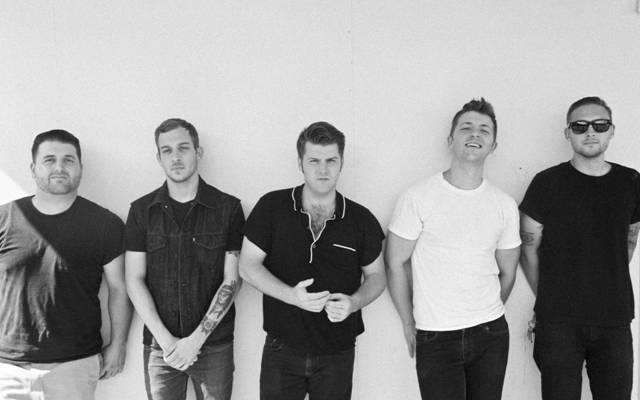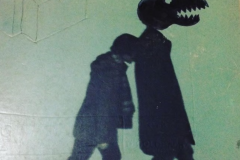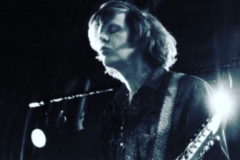Interview: Chris Martin of Hostage Calm
Hostage Calm recently announced an October 9 release for their ambitious new LP, Please Remain Calm. The album, produced by indie icon J. Robbins, will be issued via Boston’s Run For Cover Records and promises to be a punk album for the Great Recession. The follow up 2010’s critically acclaimed self-titled LP, the album that combines elements of Springsteen-esque heartland rock with the band’s signature blend of 60s pop melody, 70s punk energy and 80s new wave panache.
But Please Remain Calm is more than Hostage Calm’s opus: it’s their manifesto. The band, who aren’t afraid to bring tough issues to the table, push musical and political boundaries at every turn and that is what gives them their appeal; they have substance in a punk landscape where depth isn’t necessarily around every corner.
Following the album drop, the band will be supporting Into It. Over It. on their first full band tour from October 17 through October 31. They later hit the streets with Streetlight Manifesto on The Always Almost Home Tour from November 13 to December 7. Ghettoblaster managed to catch up with singer Chris Martin in the days before all of this activity to ask him a few questions about the band’s sound, new record, working with J. Robbins, and being young and punk during a recession. Here’s what he told us….
I can hear that Baltimore/D.C. influence in the introduction of “Mistrust Earned.” Do you still live in that area? Who were the bands from that area that you grew up following?
I still live in Baltimore. I think that a lot of the DC emo and hardcore bands really influenced my childhood, and while that’s not something I’m trying to ape at this point, I think it’s in the music. Those bands defined what energetic, emotional, and socially relevant music meant to me. Minor Threat, Embrace, Dag Nasty, Fugazi, etc. All of these were pretty critical in shaping our view of music as a means to experiment and express things we otherwise couldn’t
What were some of the catalysts inspiring your output when you began writing the new record in January?
Well, in earnest, the early stages of some of these songs happened DURING self-titled. But over the past year, I think I just became very depressed; it just seemed like my friends and I were treading water. I felt like our generation was going through a defining moment with this recession, and that punk was absolutely absent from discussing the pain and heartache going on all around me. I felt responsible. And I began to see this sort of movement in my head, in which punk finally woke up to the depression of being young in such a stagnant time. That drove the writing more than any musical realizations (of which there were many) over the past year.
Is there a theme that ties Please Remain Calm together? How does it differ from your previous record?
I think there’s this constant fear of abandonment across the record. There’s this longing for something better, but this oppressive feeling that things will never get better. I think we really focused on how America FELT right now. We didn’t want to discuss the sloganeering, the bickering between sections of America. We wanted it to sound like the new grad moving his or her shit back home in defeat for the first time. We wanted it to sound like never getting out of the town that never felt like home. The sound of the foreclosure sign going up in front of your childhood home.
What is it like to be a band in America while it is on the decline?
I think we feel a special responsibility to capture something about this time. Our favorite records are always great records in the timeless sense, but their greatness is even deeper when you consider the context in which the record was released. Born to Run coming out in stagnant, empty 1975 America. Or London Calling coming out in the darkness of 1979 UK. The story of this generation needed to be told through music. It’s a sad time to be young, and everyone with a pulse knows it. It’s time we start talking about it.
I know you did the record with J. Robbins, but wasn’t Chad Gilbert a candidate for producer too? How did you come to the conclusion about who would do the record?
I’d rather not discuss who could have done the record. We talked to a bunch of great people, and J. Robbins just seemed to be the fit for us. We were just on the same page. We wanted to do a more organic record and live-track it to tape. We wanted it to be a timeless record. We wanted to make a record that was a force. He saw that big picture. He understood our band knew what we were doing, and I think he was able to bring out the best in us, instead of being in a command role.
My friend is a drummer and he said one of his goals of being in a band is recording drums with J. Robbins. How do the drums sound?
Warm, roomy, real, driving: everything we could have wanted from a drum-sound. J. Robbins truly is a master of drum tracking. I asked him the first day if he had a Drum Dial to tune the drums with, and then he kind of chuckled and tuned the whole kit perfectly by ear.
Same-sex marriage is a cause that Hostage Calm has embraced, and emblazoned on merch even. How did you become involved in the cause?
The injustice is so obvious, and I think most people in punk are waking up to that. We just felt like poetic lyrics in a song weren’t driving the cause hard enough to our fans, so we made the shirts and got involved with Equality Maryland with the donations. We’ve always been singing about it, but since our S/T record brought us more into this national scene, we’ve had a lot more opportunities to speak our minds and get involved with this topic.
Are you worried about the upcoming election, especially in light of what happened with Chic-Fil-A earlier this year?
I’m always worried when the issue of same-sex marriage comes to a popular vote, because the U.S. is not supposed to be a mob-rule situation where the many decide the legal rights of the few. Referendums are inappropriate in this context. As for the Presidential Election, yes I am worried. America is stuck in an intractable problem, a real malaise, and I don’t think we are seeing any real solutions on either side.
I actually got my copy of Hostage Calm’s record through AP by signing a petition in support of marriage equality. That was my first exposure to the band. How did that collaboration – between you guys and AP – come about?
We just told them about our idea and they were 100 percent behind it. Plain and simple. They’ve given us a lot of opportunities to speak out on this issue, and we’re really thankful.
You spent the Summer on the Warped Tour and I imagine there was a bro or two who told you they didn’t care for your message, right? How do you deal with that?
Frankly, I think a lot of kids were receptive and down with the idea of marriage equality. For young kids, it might not have been something they’ve had the chance to think much about, but they were pretty open-minded. I think there’s a lot more support out there for this cause, and I think that part of the role of bands and the scene is to bring that support to the surface.
Earlier this year you did a European tour with Anti-Flag? What was it like being on the road with dudes who are as unapologetically political and seasoned musical as they are?
Anti-Flag was a true inspiration. That band is such a well-oiled political force and live machine. Every night we just watched them and tried to learn how to really be a life-changing band. They are truly great.
What are Hostage Calm’s plans for the rest of 2012? Is there are full-blown support tour planned for that?
The record comes out on Oct. 9th and we will be hitting everywhere in America, and then abroad. Touring to FEST w/Into It. Over It. and Make Do and Mend, and then doing a full U.S. tour w/Streetlight Manifesto. We will also have Record Release shows and overseas touring to announce.









Social Media